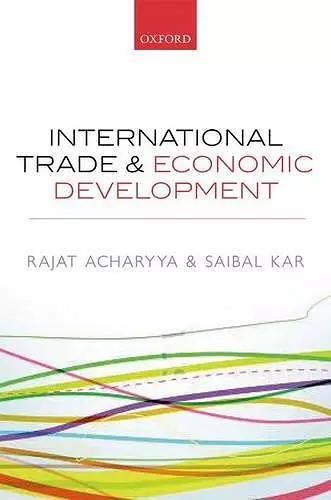International Trade and Economic Development
Saibal Kar author Rajat Acharyya author
Format:Hardback
Publisher:Oxford University Press
Published:17th Jul '14
Currently unavailable, and unfortunately no date known when it will be back

This graduate textbook offers advanced and contemporary readings in international trade and economic development and provides an overview of the fundamental topics in this area. It brings together many of the issues that are considered staple reading for a course in trade and development and it offers a systematic coverage of the relevant and state of the art research on various aspects of the subject. This includes detailed analysis of important sub-topics such as: trade and labour market, trade and public economics, the theory of the second best, foreign aid, factor mobility, and regional and global welfare. It also covers international trade and labour standards, the informal labour market, and TRIPS. Aimed at post-graduate students interested in trade theory and applications in development issues, this book should also prove a valuable resource for practicing economists, policy makers, and advanced undergraduate students studying international trade. The text balances extensive coverage of available literature in the area with substantive inclusions from new research published in leading journals and volumes. It aims to fill the gap in the teaching resources and should promote further theoretical and empirical research in the subject.
The title of this new book by Acharyya and Kar says a lot by suggesting that the process of growth and development for most countries is closely linked to the extent of their involvement in international trade. The basic Ricardian concept of comparative advantage shows how all countries can in many ways make use of trade with other countries to support higher rates of growth and development. International trade allows a country to focus on producing not the entire range of commodities consumed, but instead to concentrate on producing the commodities in which it is relatively efficient in production, and all countries have such possibilities. The authors provide ample examples of how countries have raised living standards by taking such advantages provided by globalization. [continued below]
Their discussion leads up to the present state of trade in which fragmentation of the production process offers the possibility of a much finer division of labor, opening up a sizable gain when parts and components are themselves tradeable, allowing ever greater gains from trade based on the Ricardian conception. The reader is carefully led through historys gains based on more open capital markets and the re-alignments suggested by comparative advantage. For countries anxious to develop, more open international trade is the basic route to obtain such gains. * Ronald Jones, Xerox Professor of Economics, Economics Department, University of Rochester *
This is a magnificent text which fills a real gap with a very lucid and insightful treatment. I recommend it most highly both to all students interested in trade and development and also to the faculty charged with teaching them. * Wilfred J. Ethier, Professor Emeritus of Economics, University of Pennsylvania *
The structure of the book differs from that of a typical textbook on international trade. The reader is offered an analysis of the theoretical issues in international trade and economic development in an interconnected way, that is, how global markets affect the countrys economic growth and pattern of development. This is a novel approach, and combined with a rigorous analysis of the topics covered, it will appeal to readers interested in the theoretical aspects of globalisation and development. * Tatyana Chesnokova, Economic Record *
ISBN: 9780199672851
Dimensions: 235mm x 161mm x 25mm
Weight: 604g
334 pages